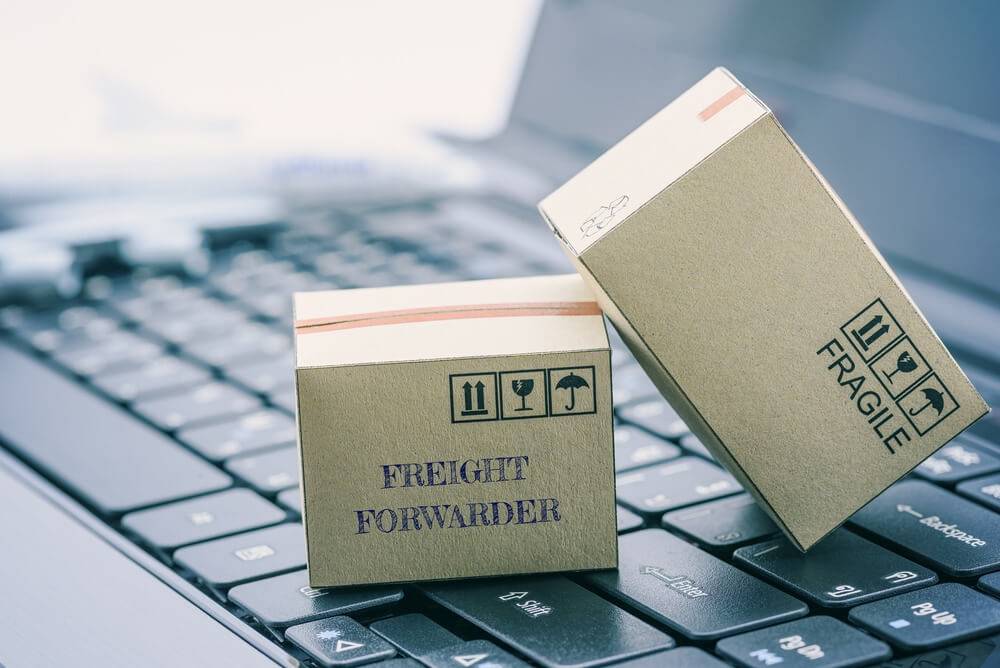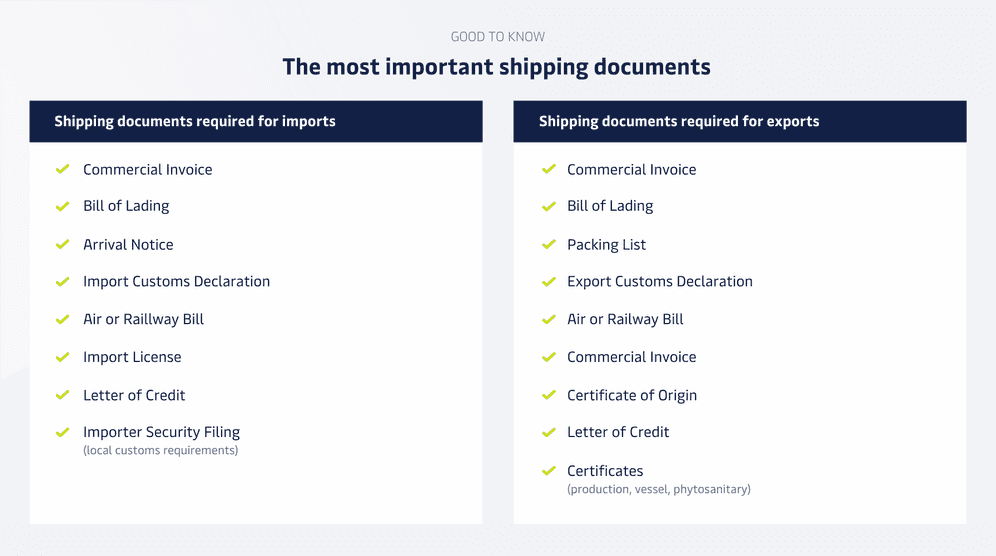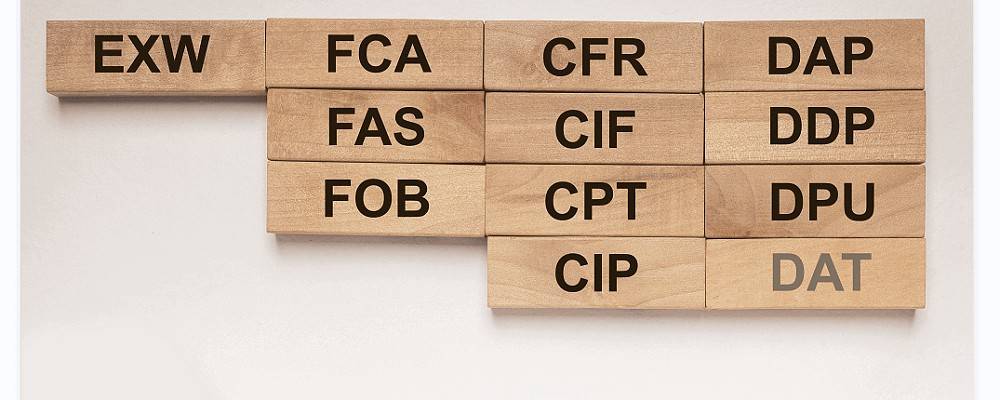2023-03-02
If you plan to transport your cargo internationally, you need to know the necessary documents to ensure a successful transportation process. This article will explain what documents do you need to ship internationally, including commercial invoices, export/import declarations, packing lists, bills of lading and sea waybills, certificates (production, ship, phytosanitary), air or rail waybills, and more. Understanding and managing these documents is important to ensure that your cargo reaches its destination smoothly and to avoid any delays or problems. We will also provide practical tips on how to prepare and handle these documents, as well as explain their importance in complying with customs regulations and international trade laws. Whether you are an individual or a business owner, this guide will help you understand what documents do you need to ship internationally and make your shipping experience easier and hassle-free.

When shipping internationally, it is vital to prepare the necessary documents. These documents ensure the safety and legality of your cargo throughout the shipping process. This article will detail what documents do you need to ship internationally, including commercial invoices, export/import declarations, packing lists, bills of lading and sea waybills, certificates (production, ship, phytosanitary), air or rail waybills, etc., and their role and importance.
While most of these documents are mandatory, some of them depend on the type of goods you are shipping and the origin and destination of your shipment. Therefore, it is important to know which documents are required for your shipment before you start shipping. When you purchase certain shipping services from us, we will definitely ask you to provide the required documents. This way transportation becomes easier for you!
Commercial invoice is one of the most basic freight documents in international transportations. It is an invoice issued by the seller (exporter) to the buyer (importer). It records the details of the goods, including the name of the goods, quantity, price, total price and information about the buyer and seller. The commercial invoice is the basis for customs declaration and taxation. Customs will determine the authenticity and value of the goods based on the commercial invoice to determine the tax payable. Therefore, the accuracy and completeness of the commercial invoice is very important for the smooth passage through customs. It is necessary in the customs clearance process.
The customs declaration is one of the most important documents in international transportation, which records the details and value of the goods and describes their nature and purpose. The declaration must be submitted to Customs, which will determine whether the goods comply with regulations and rules based on the declaration. Customs declarations are the basis for Customs to regulate and tax the goods, so it is important that they are accurate and complete to avoid any problems or delays. An export or import declaration lists the details of the imported or exported goods. Describing it in legal terms, by means of a customs declaration a person indicates the desire to place the goods under a specific customs procedure. This declaration is used for customs clearance and calculation of duties or taxes applicable to the goods. It is prepared by the customs broker using the invoice and packing list. At JIKEship, we are here to help you with customs clearance.
Packing list is another important freight document in international sea transportation. It records the details of the goods loaded in each container, including the trade name, quantity, weight and volume. Packing list is very important to ensure the safety of the goods during transportation, because it records the condition of the goods in each container and can prevent the goods from being lost or damaged during transportation. It is a detailed overview of the goods mentioned on the commercial invoice above. It also includes information about how the goods are packed and what markings and numbers are indicated on the outside of the shipping container.
The bill of lading is a document proving ownership of the goods, recording information on the shipment and receipt of the goods, the quantity and quality of the goods, and the name and address of the shipping company. The bill of lading is usually provided by the shipping company or airline, and the cargo owner must acknowledge and sign the bill of lading upon receipt to confirm that the goods have been loaded onto the ship or aircraft. After the goods arrive at the destination, the consignee needs to present the bill of lading in order to take ownership of the goods.
Sea waybill is also a contract of carriage. However, the sea waybill is not necessary for the delivery of the goods and will only be issued as a receipt for the goods. In addition, the sea waybill is not transferable and cannot be assigned to any third party.
As part of the important freight document, depending on the type of your cargo, you may need to provide one of the following certificates.
Production Certificate: This certificate covers the type of material or product that uses sustainable resources or approved methods (e.g. sustainable wood sources). The requirement allows for the shipment of goods into or out of areas where production-related regulations may apply.
Ship Certificate: The main purpose of the ship certificate is to verify ownership of the ship. The certificate is usually required as part of the letter of credit requirements.
Phytosanitary Certificate: A phytosanitary certificate is a document that certifies that plants, and plant products, are free of qualifying pests. It also states that the goods meet other phytosanitary requirements as specified by the importing country.
Depending on your shipping method, you will be issued an air or rail waybill. An Air Waybill (AWB) is a non-negotiable document issued by the air carrier as an acknowledgement of ownership of the goods.AWB is also a type of bill of lading. However, it is issued in a non-negotiable form and therefore has less protection than the bill of lading.The AWB also serves as a receipt for the consignor (shipper). It shows the destination address of the shipment and the contact information of the consignor and the consignee (consignee).
In contrast, a rail waybill is a freight document used for shipments via rail. This document is prepared by the freight forwarder or railroad company upon receipt of instructions from the shipper.
Another important document at the time of shipment is the Arrival Notice or Notice of Arrival, which informs about the arrival of the goods at their destination. It includes relevant details such as description of the goods, details of the voyage, country of destination in relation to customs charges and contact information of the sea carrier. It is issued by the ocean carrier's destination agent to the consignee and the parties that may need to be notified on the bill of lading.
A certificate of origin is a document that declares the country/region in which the goods or merchandise were manufactured. It needs to be periodic. This document contains information about the product, its destination, and the country/region of export. It is an important form because it helps determine whether the goods are eligible for import and whether they are subject to customs duties.
An Importer Security Filing (ISF) may be required for your shipment. This document is a U.S. Customs and Border Protection regulation that applies only to the importation of ocean shipments. The importer should send the data required for this document to their U.S. customs broker prior to issuing the shipping order, as it needs to be filed with U.S. Customs and Border Protection 24 hours prior to sailing from the last port of origin. The required data includes the names and addresses of the buyer and seller, the importer of record, the final consignee, the name and address of the manufacturer, and the country of origin.
A letter of credit is the primary method of payment in international trade transactions. It is irrevocable by default. It is a promise by a bank on behalf of the buyer (importer) to the seller (exporter) to provide a specified amount in an agreed currency. In addition, it requires the seller to submit the required documents within a predetermined period of time. In addition, it includes a description as well as information on the quantity of the goods, technical description and documentation requirements.

In addition to these necessary freight document, there are other documents that may be required in the process of international transportation, such as transport insurance policies, health certificates, quality inspection certificates, etc. The specific needs of these documents vary from country to country and region to region, and the specific requirements need to be understood and confirmed according to the regulations and rules of the destination country.
Understanding the role and importance of these necessary freight document will help you to have a smoother process in international transportation. Also, to ensure the accuracy and completeness of the documents, it is recommended that you carefully check the information on each document before shipping. Any errors or omissions may lead to rejection or delay of the shipment, causing you unnecessary troubles and losses. It is also important to note that different destination countries may have different regulations and rules that need to be carefully understood and followed.
Whether you are processing a bill of lading, creating a shipping packing list, customs invoice or commercial invoice, or preparing a certificate of origin at the port - Incoterms® provides guidance. Do you want to learn more about Incoterms®? Then read more here.
In conclusion, the documents needed to ship your goods are key to ensuring that they are transported safely and legally. Commercial invoices, bills of lading, packing lists and customs declarations are the most basic documents that need to be carefully prepared and checked. In the process of preparing freight document, it is necessary to comply with the regulations and rules of the destination country and to ensure the accuracy and completeness of the documents in order to avoid any possible problems or delays.
We hope that this article has helped you to better understand what documents do you need to ship internationally, so that you can have a smoother and more secure international shipping process. If you have any further questions or need further assistance, please feel free to contact us and JIKEship will be happy to assist you.

Entering global trade means that your responsibilities involve importing and exporting goods - which requires an understanding of Incoterms in logistics.
2023-01-13
We use third-party cookies in order to personalise your experience.
Read our cookie policy